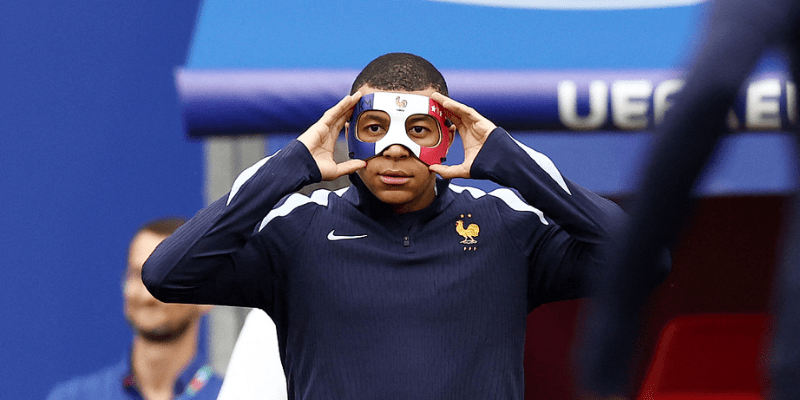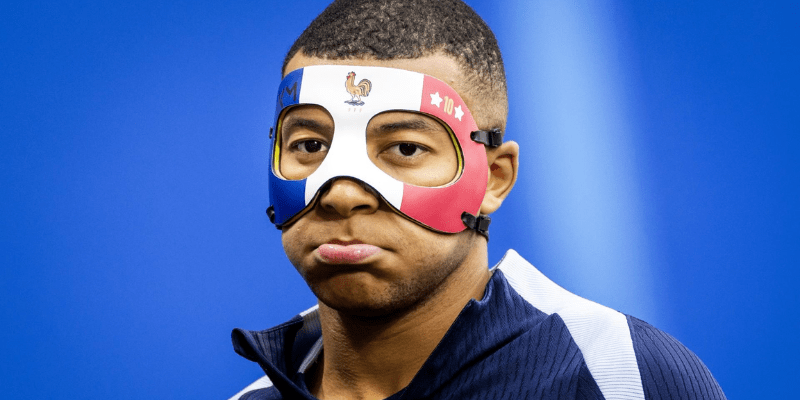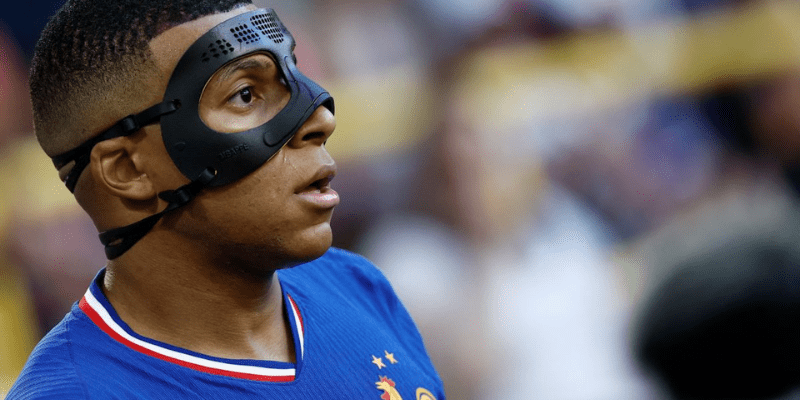It’s a question that caught fire across social media during Euro 2024: why Mbappé is wearing a mask. The face guard became a visual symbol of resilience, but behind it lies a dramatic story of injury, recovery, and tough decisions. In this article, CantoKick will guide you through the full narrative—, and what it reveals about Mbappé’s warrior spirit.
The Incident: Broken Nose in France vs Austria
The story begins on June 17, 2024, during France’s opening group match against Austria. In a heated battle for a header, Mbappé collided head-on with the shoulder of Austria’s Kevin Danso. The blow was harsh and immediate: blood visibly poured from Mbappé’s nose, sending shock through the stadium. Medical staff rushed in, he was substituted, and later scans confirmed a fractured nose. The French Football Federation announced he would not undergo surgery immediately and that a protective mask would be considered to allow a return to play., the world of football shifted: not only was Mbappé forced to face a sudden setback, but he also had to contend with the invasive reality of playing while masked—a rare, but not unknown, phenomenon in elite football.
Why A Mask? The Medical Rationale and Risks

The decision to wear a mask seems simple: protect an injured nose. In practical and medical terms, the mask serves several purposes:
- Protection and stabilization. A face mask helps distribute and absorb forces across the face, shielding the nasal bone during collisions.
- Prevent further damage. In a high-contact sport, a healing nose is vulnerable. The mask is a buffer.
- Continue without surgery. Surgery would have sidelined him for weeks; wearing a mask provided a compromise that allowed him to stay in the tournament.
Yet, this solution came with big trade-offs.
Downsides and challenges
Mbappé himself described playing with the mask as “an absolute horror,” citing several real drawbacks:
- Reduced vision and peripheral awareness. Even a small obstruction can cost precious reaction time.
- Sweat accumulation. The mask can trap moisture, causing blur or itchiness in the eyes.
- Discomfort and form issues. Mbappé admitted to trying multiple designs, swapping masks frequently because none fit perfectly.
- Mental obstacle. He said the first days felt like wearing 3D glasses—not natural, disorienting.
Even France’s manager acknowledged the problems: the mask forces adaptation, and Mbappé’s peripheral vision would be limited. On hot days, sweat would become a serious irritant.
The UEFA Mask Rules Controversy

Mbappé’s mask became more than a medical tool—it became a battleground between player preference and governing regulations. Initially, Mbappé experimented with masks featuring France’s red-white-blue colors, even asking fans for ideas on social media. But UEFA intervened: medical equipment worn on the field must be of a single, neutral color, without any branding or team association. Thus, his French-flag mask was banned, and he was forced to wear a plain black variant instead.
Additionally, some matches raised eyebrows when Mbappé appeared without a mask. For example, in the Euro semi-final vs Spain, he started unmasked. Official explanations pointed to his comfort and a reassessment of risk—but it also illustrated just how restrictive and awkward the mask saga had become.
Return to the Field: Performance With The Mask

After missing France’s second group match (vs Netherlands), Mbappé returned wearing the mask in the final group game against Poland—and scored a penalty. It was a symbolic comeback, but performance under the mask was far.
- Limited rhythm. Mbappé was visibly not “in flow” as he often is, constrained by the mask’s constraints.
- Physical discomfort. Sweating, slight movement of the mask, and vision issues haunted his play.
- Psychological strain. Playing while masked made him a target in aerial duels, and he admitted a growing fear that opponents might look to test the injury.
France’s coach admitted that despite his obvious talent, Mbappé was adapting and needed to adjust—not just his body, but his natural style. The mask scenario forced caution, especially in tight spaces or high-pressure moments.
The Psychology of Sporting with a Mask
Beyond the medical and technical dimensions lies the psychological weight of donning a mask in front of millions. For a player of Mbappé’s stature, the mask is a visible scar, a constant reminder of vulnerability. He joked about it, complained about it, and sometimes seemed almost at war with it.
But it also became a symbol:
- Resilience. Even injured, even hindered, Mbappé insisted on contributing.
- Vulnerability in public. Fans glimpsed a superstar coping with a very human limitation.
- Iconography. The mask made him look like a modern gladiator, reminiscent of players.
The mask era became part of Mbappé’s evolving narrative—less about aesthetics, more about courage under pain.
Earlier Cases: Other Masked Football Legends
Mbappé wasn’t the first great player to tie on a face guard. History provides examples:
- Paolo Maldini. After facial fractures, he trained and sometimes played with a mask.
- Diego Maradona. In a 1984 match, he wore a protective mask after a broken cheekbone.
- Mascherano. In his later days, he wore a face visor after head collisions.
These cases show that while rare, facial protective gear has precedent—and always carries a dramatic weight in big matches.
Did Mbappé Remove the Mask? The Semi-Final Unmasking
In the Euro 2024 semi-final against Spain, Mbappé made a bold move: he started without his mask. The decision surprised fans and analysts alike. Reports suggest it was based on discomfort, game sense, and medical advice that the risk was marginal compared to the hindrance.
Ironically, the moment he discarded the mask, he seemed to rediscover a bit of fluidity. He assisted France’s opening goal early in the game, showing what happens when a player’s natural motion returns. It was a gamble—and one that underscored how much the mask had held him back.
What This Reveals About Mbappé’s Character
Wearing a mask at such a moment in his career reveals several dimensions of Mbappé:
- Relentless ambition. Even while injured, he fought to stay on pitch.
- Willingness to bear discomfort. He endured a mask he openly “hated” just to contribute.
- Mental edge vs. physical constraint. He had to battle more than defenders—he battled himself.
- Media and symbolic strength. The mask era added depth and humanity to his legend.
In many ways, why Mbappé is wearing a mask is not just about injury—it’s about a champion refusing to surrender.
Final Thoughts
Why Mbappé is wearing a mask is a story of pain, adaptation, and defiance. It reminded fans that even the greatest must sometimes fight invisible battles—not just with opponents but with their own bodies.
CantoKick hopes this tale adds depth to your understanding of Mbappé’s journey. If you’re eager for more—match reviews, player psychology, injury comebacks—stay with us, and return for insights that go beyond the headlines.
